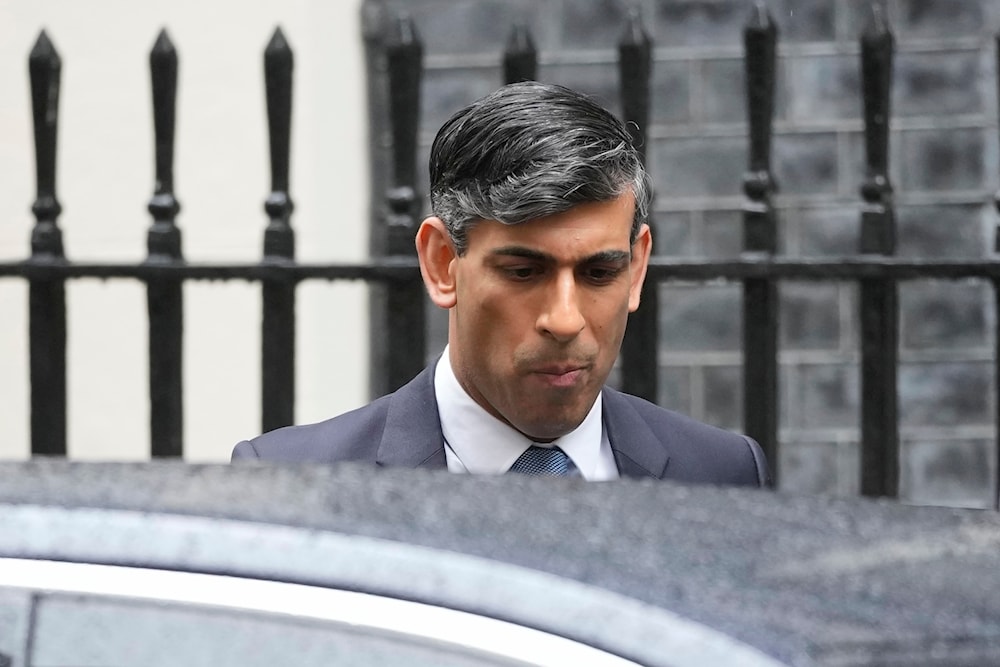UK's Sunak says national elections to be held in second half of year
Rishi Sunak fails to give a clear answer to address the rumors that resurfaced today saying that he might call for national elections earlier than expected and in July.
-

Britain's Prime Minister Rishi Sunak leaves 10 Downing Street to go to the House of Commons for his weekly Prime Minister's Questions in London, on Wednesday, May 22, 2024. (AP)
Addressing unconfirmed rumors in the UK's parliament that Prime Minister Rishi Sunak might call for an election poll in the summer, the British leader said today that a national election will take place in the second half of this year.
"Spoiler alert: there is going to be a general election in the second half of this year," Sunak told parliament.
Several questions were asked to Sunak on a possible early election with the line that the next national vote will take place in the second half of the year, with some lawmakers predicting that the elections will happen in the latter part of this year.
However, Sunak never gave a clear answer to address the rumors that resurfaced today saying that he might call for national elections earlier than expected and in July.
Sunak's Press Secretary also declined to be drawn on the rumors.
"I know there is a lot of interest in this, as there has been pretty much every week over the last five months, I will just say the same thing I have always said, which is I am not going to rule anything in or out," she said.
Labour's landmark victories have Sunak treading a tightrope
Labour's Sadiq Khan clinched an unprecedented third term as London's mayor on May 5, leading his party to victory in a series of mayoral and local elections, dealing a significant blow to the ruling Conservatives ahead of an anticipated general election.
Khan, aged 53, defeated Conservative opponent Susan Hall by an 11-point margin, dashing largely dim hopes among Tories of wresting control of the UK capital from Labour for the first time since 2016.
In the West Midlands, Conservative mayor Andy Street, vying for a third term, suffered an unexpected defeat to Labour's Richard Parker, delivering a significant setback to Prime Minister Rishi Sunak.
The disappointing outcome only left the embattled leader with one significant victory in the May 2 elections across England. Tory mayor Ben Houchen managed to secure a win in Tees Valley, northeast England, albeit with a significantly reduced majority. The Conservative party faced a dismal set of results, finishing a humiliating third in local council tallies, having lost nearly 500 seats.
Labour, who has been out of power since 2010 and suffered a heavy defeat by Boris Johnson's Conservatives in the last general election in 2019, also decisively won a parliamentary seat from the Tories.
Keir Starmer has capitalized on this victory in the Blackpool South constituency and other achievements to call for a general election.
Sunak is obligated to call for a national vote by January 28 next year at the latest, and he has indicated that he intends to hold a poll in the latter half of 2024.
Throughout his 18 months in leadership, Labour has consistently held double-digit leads in polls, as previous Tory controversies, a growing cost-of-living crisis, and other challenges have weakened the Conservative Party's position.
During elections on May 2, Labour was tasked with defending nearly 1,000 council seats, many of which were gained in 2021 when the party was leading in national polls. However, the situation changed following the downfall of Boris Johnson's premiership and the turbulent 49-day tenure of his successor, Liz Truss.
Ultimately, Labour lost nearly half of the seats they were defending and ended up in third place behind the smaller centrist opposition, the Liberal Democrats.
Labour secured significant victories in key mayoral races across England, including in Yorkshire, Manchester, Liverpool, and various contests throughout the Midlands.
If the results were replicated in a nationwide contest, Labour would secure 34 percent of the vote, with the Tories falling behind by nine points, as per BBC.

 4 Min Read
4 Min Read








